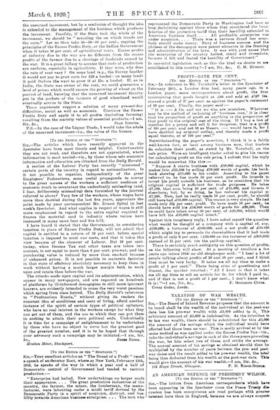[To THE EDITOR OF THE " SPECTATOR."]
SIR,--The articles which have recently appeared in the Spectator have been most timely and helpful. Unfortunately they are not read, and therefore are not appreciated, where information is most needed—viz., by those whose sole economic information and education are obtained from the Daily Herald.
A section of the Labour Party has recently "misaioned " certain parts of the country in regard to nationalization. Is it not possible to organize, independently of the great Employers' Federations, some useful propaganda to convey to the great masses of the workers a sufficient modicum of economic truth to counteract the undoubtedly misleading (and. I fear, deliberately misleading) data furnished by the journal referred to above? Very few of the workers, whose wages have more than doubled during the last five years, appreciate the point made by your correspondent Mr. Ernest Spital in last week's Spectator. And what applies in respect of wages is still more emphasized in regard to the extra capital required to finance the material used in industry where values have increased in many cases four and five fold.
I have heard it stated that the Government, in considering taxation in place of Excess Profits Duty, will not admit that capital is entitled to a return of 10 per cent. before special taxation is imposed to meet war costs, and that it takes this view because of the clamour of Labour. But 10 per cent. to-day, when Income Tax and other taxes are taken into account, is not equal to more than 6 per cent. pre-war, and the purchasing value is reduced by more than one-half because of enhanced prices. It is not possible to maintain factories in that state of efficiency absolutely necessary to keep them in work without having a much larger margin both to work upon and retain than before the war.
The attacks made upon capital and its administration, which
appear in many newspapers, and are repeated on hundreds of platforms by ill-informed demagogues to still more ignorant hearers, are evidently intended to rouse the very worst passions which spring from class hatred. The Daily Herald's references to "Profiteerless Russia," without giving its readers the remotest idea of conditions and costs of living, afford another instance of the spirit of certain types of political agitators. who have no real interest in the workers except for what they can get out of them, and the use to which they can put them in seeking to attain their own political ends. Undoubtedly it is time for a campaign of enlightenment to be undertaken by those who have no object to serve but the greatest good of the greatest number, and it is to be hoped that through your advocacy such a campaign may be inibiated.—I am, Sir,
Heaton Moor, Stockport.










































 Previous page
Previous page